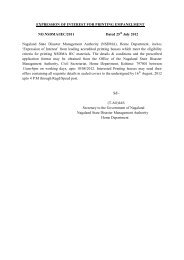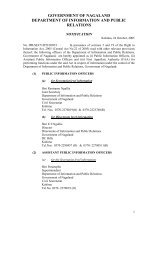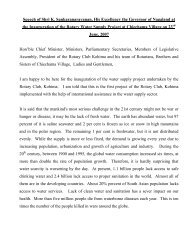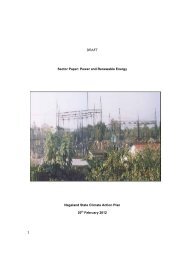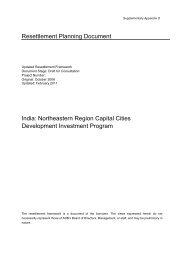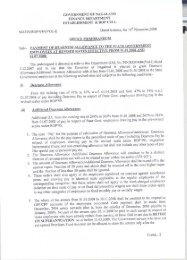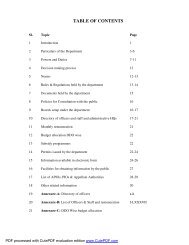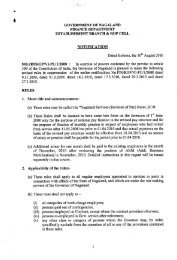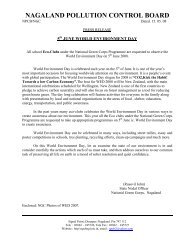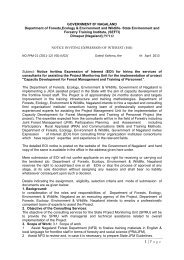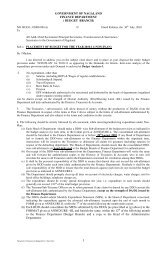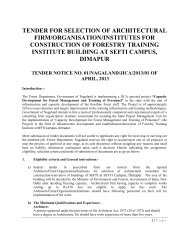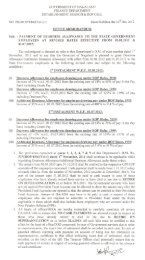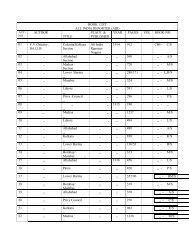Speech of Shri K. Sankaranarayanan, His Excellency ... - Nagaland
Speech of Shri K. Sankaranarayanan, His Excellency ... - Nagaland
Speech of Shri K. Sankaranarayanan, His Excellency ... - Nagaland
You also want an ePaper? Increase the reach of your titles
YUMPU automatically turns print PDFs into web optimized ePapers that Google loves.
<strong>Speech</strong> <strong>of</strong> <strong>Shri</strong> K. <strong>Sankaranarayanan</strong>, <strong>His</strong> <strong>Excellency</strong> the Governor <strong>of</strong> <strong>Nagaland</strong> on<br />
‘The International Day Against Drug Abuse and Illicit Trafficking’ at Kohima on 26 th<br />
June, 2007<br />
Dr. P. Ngully and his colleagues in the Regional Resource and Training Center and the Kripa<br />
Foundation, Representative from United Nations Office on Drugs and Crime, N-Naga-Dao<br />
and other NGOs, Participants, Ladies and Gentlemen,<br />
Today, we have gathered here as partners in the launching <strong>of</strong> a three year international<br />
campaign against drugs. The ‘International Day Against Drug Abuse and Illicit Trafficking’<br />
is observed on June 26 every year. It is, therefore, befitting that the campaign is being<br />
launched on this day.<br />
Drugs are not new to humans. In fact, the mankind has been using drugs for medicinal<br />
purposes from time immemorial. Drugs were also consumed for recreation and on religious<br />
occasions. But the harmful effects <strong>of</strong> addictive drugs such as opium were also realized. The<br />
Chinese emperors prohibited opium in the 18 th century. But due to lack <strong>of</strong> international<br />
consensus, the illegal trade in opium continued. The spread <strong>of</strong> opium addiction led to the<br />
international efforts to ban opium in the early 20 th century.<br />
While economic greed continues to drive illicit trade in drugs, the emergence <strong>of</strong> more<br />
dangerous varieties <strong>of</strong> drugs has made the situation worse. With the advancement <strong>of</strong> science,<br />
stronger drugs have been synthesized. Some <strong>of</strong> them have medicinal uses. Unfortunately,<br />
they are also highly addictive and dangerous.<br />
Today, we have an international consensus against drugs. But the drug trade is very much<br />
alive. India is located between two major illegal opium producing areas - the Golden<br />
Triangle comprising Myanmar, Thailand and Laos, and the Golden Crescent comprising<br />
Afghanistan, Pakistan and Iran. Afghanistan is the world’s largest producer <strong>of</strong> illicit opiates
while Myanmar is the second largest. India is both a transit route and a destination for such<br />
drugs. About 3 million people in the country are estimated to be the victims <strong>of</strong> drugs.<br />
Smuggling <strong>of</strong> drugs from Myanmar poses a threat to the north eastern States, including<br />
<strong>Nagaland</strong>. Opiates are being smuggled through <strong>Nagaland</strong> from Moreh and from areas<br />
bordering Myanmar. Prescription drugs are being smuggled from other States for illicit drug<br />
use. There is high incidence <strong>of</strong> intra-venous drug use in the State leading to spread <strong>of</strong><br />
HIV/AIDS. The Central and the State agencies should coordinate effectively and make<br />
renewed efforts to check smuggling <strong>of</strong> drugs.<br />
If the drug availability is one half <strong>of</strong> the problem, the willingness to consume drugs is the<br />
other half. I would say that it is the more important factor. Today, we know that social<br />
conditions play a critical role in vulnerability <strong>of</strong> our youth towards drugs. The traditional<br />
tribal society has seen too much <strong>of</strong> change within a few decades. Urbanization and<br />
modernity have diluted traditional social controls within the community and the family. This<br />
has made our youngsters more vulnerable to drugs.<br />
The response to this challenge must come from within the community. I am glad to notice<br />
that specialized NGOs have come up in <strong>Nagaland</strong> to generate awareness and make<br />
interventions against drug use. Linkages with such NGOs, community based institutions and<br />
Government agencies should be strengthened for increasing the effectiveness <strong>of</strong> the fight<br />
against drugs.<br />
A deeper understanding <strong>of</strong> the drug use in all its aspects is needed to improve our<br />
effectiveness. Better intelligence on drug smuggling, pr<strong>of</strong>iling <strong>of</strong> drug users and also <strong>of</strong><br />
those vulnerable to drugs, documentation <strong>of</strong> the successful interventions and their analysis<br />
will equip us better to fight the drug menace.
While cure is important, prevention remains the key. We have to devise effective<br />
communication strategies to sensitize the youth to the dangers <strong>of</strong> drug use through the<br />
schools and colleges, the Churches and other platforms.<br />
With these words, I wish the Regional Resource and Training Center <strong>of</strong> Kripa Foundation<br />
and the Network <strong>of</strong> <strong>Nagaland</strong> Drugs AIDS Organization all success in this important<br />
mission.<br />
God bless.<br />
Jai Hind.



